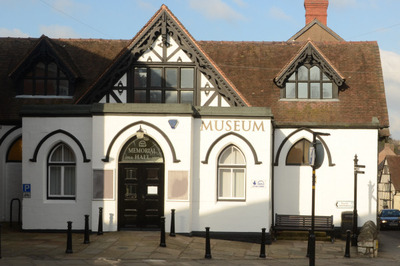Much Wenlock Timeline
Published 26 April, 2011The town history is so varied where do you start?
Well 430 million years ago we were undersea and part of a coral reef!
In the town museum you can learn where to find fossils and the social history of the town from the arrival of the Romans in the 1st century through to the Victorians. And of course how the town inspired the birth of the modern Olympic Games.
430 million years ago
Wenlock was under sea. Wenlock Edge was a coral reef and today's fossils were being formed.
1 AD
Evidence has been found of Roman occupation
680 AD
Monastery built on the site of Wenlock Priory for monks and nuns. Milburga, daughter of Merwalh, and founder, was an abbess on the site and because of her miracles was made a saint after her death.
1100
Holy Trinity became a parish church, having sustained many renovations before and after.
1224
Wenlock gained the right to hold a weekly market
1247
Wenlock became a town.
1300s
Stone jail built, now the far end of the Guildhall
1468
Borough charter granted by Edward IV which included 17 parishes. However the Priory retained power over the town until its dissolution.
1540
Dissolution of the Monasteries by Henry VIII, including Wenlock Priory.
1540
The Courthouse was built at the Guildhall
1577
Council Chambers erected as part of the Guildhall. Erected over 2 days 23-24 September. This was an early version of prefab construction!
1600
Windmill built early this century.
1642
Charles I stayed at Ashfield Hall (now a privately owned property on the High Street).
1726
Spire added to Holy Trinity Church.
1800's
Bull baiting stopped at The Bull Ring.
1809
13 August birth of Dr. William Penny Brookes, founding father of the modern Olympic movement.
1835
Wenlock got its first mayor.
1848
National School created to provide affordable education for the locals. Interior of Guildhall “improved” with Tudor panelling of magnificent workmanship.
1850
First Wenlock Olympian Games held. Construction started on Wenlock’s railway.
1851
Construction of Corn Exchange started.
1852
Last offender sentenced in Wenlock courts - Thomas Lloyd. Stocks last used at Guildhall for punishment, now on display for unruly children!
1854
Agricultural reading library opened at Corn Exchange.
1857
Wenlock “witch” Nanny Morgan stabbed to death.
1860.
First Shropshire Olympian Games.
1862
Wenlock to Buildwas railway line officially opened.
1865
Dr. William Penny Brookes founded the National Olympian Society.
1878
Market hall built, now town museum.
1882
Town brook culverted, for more sanitary conditions!
1890
Baron de Coubertin acknowledged Dr.William Penny Brooke's role in modern Olympic games.
1891
Guildhall extension added making archway to Church Walk and joining shops to building.
1895
Death of Dr. William Penny Brookes.
1897
Memorials to Queen Victoria’s Diamond Jubilee placed around town.
1919
Market hall made into The Memorial Hall after the First World War.
1929-30
Holy Trinity Church spire removed.
1949
Author Mary Webb’s book GONE TO EARTH filmed in Wenlock and Shropshire.
1952
The National School closed in the Bull Ring.
1962
21 July, last locomotive left Wenlock railway station.
1966
Wenlock lost its Borough status.
1985
Courtroom at Guildhall ceased to function as a court.
1988
Town Square conceived and built for the enjoyment of locals and visitors.
2003
Queen Elizabeth and Prince Philip visited Much Wenlock to see the town’s Olympic connections.
TO THIS DAY
Wenlock still uses Holy Trinity as the parish church.
The Guildhall functions for town council meetings and mayoral events, as well as being a visitor attraction and venue for school visits.
The Memorial Hall is now the Tourist Information Centre and home of the town museum.
The Corn Exchange is still partially tied to William Penny Brookes by housing the archives and town clerk’s office and functioning as a public library.
Markets are still held in the Corn Exchange and under the Guildhall.






